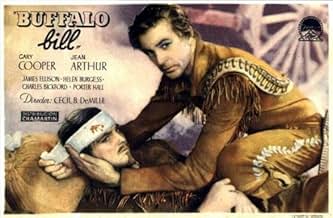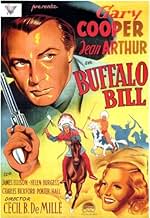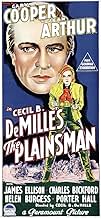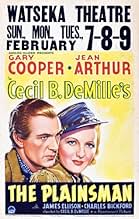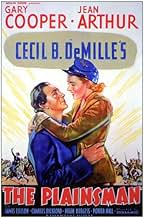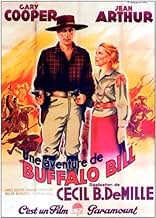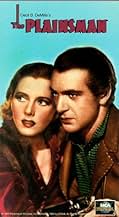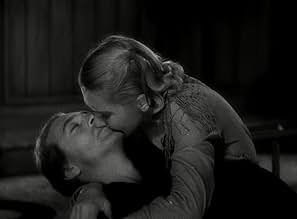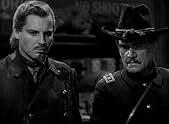AVALIAÇÃO DA IMDb
6,8/10
2,6 mil
SUA AVALIAÇÃO
Adicionar um enredo no seu idiomaWild Bill Hickok and Buffalo Bill Cody attempt to stop an Indian uprising that was started by white gun-runners.Wild Bill Hickok and Buffalo Bill Cody attempt to stop an Indian uprising that was started by white gun-runners.Wild Bill Hickok and Buffalo Bill Cody attempt to stop an Indian uprising that was started by white gun-runners.
- Direção
- Roteiristas
- Artistas
- Prêmios
- 3 vitórias no total
Fred Kohler
- Jake - A Teamster
- (as Fred Kohler Sr.)
Pat Moriarity
- Sgt. McGinnis
- (as Pat Moriarty)
Avaliações em destaque
This Cecil B. DeMille movie has all the trademarks of that director. It's a big and spectacular look at the Old West. Perhaps there's a bit too much emphasis on creating an epic and not enough on telling a good story.
To be clear, I don't mind that it takes so many liberties with historical facts. When I watch a movie I don't necessarily need a history lesson, and I can forgive a movie taking liberties in order to tell a good story.
However, there is little subtlety and emotional weight in the storytelling. In the first half, things happen to move the story along, without necessarily making much sense.
Gary Cooper, not my favorite among the western genre's big stars, is aloof as Wild Bill Hickok. No one can deny his cinematic presence, though. Jean Arthur brings some fun to her role as Calamity Jane. I have seen some reviewers praising her performance, but the problem is, she never seems convincing. Lead actresses of this era were expected to be beautiful, romantic and sensitive, and that's fine when they play a beautiful, romantic and sensitive woman, which is most of the time. But Calamity Jane? Can we buy Jane Arthur as dissolute, unconventional and wild? The script gives her more to do in this movie than most actresses get in westerns of this period, but she still has to spend the movie mooning after a disdainful Gary Cooper to provide the conventional romance.
I feel like I'm being more negative than the movie deserves. It's just the it doesn't always live up to its ambition. Once you accept that you can't take the story too seriously, you can enjoy it as harmless entertainment. In fact, it finds more focus in the second half of the movie, which is quite fine.
To be clear, I don't mind that it takes so many liberties with historical facts. When I watch a movie I don't necessarily need a history lesson, and I can forgive a movie taking liberties in order to tell a good story.
However, there is little subtlety and emotional weight in the storytelling. In the first half, things happen to move the story along, without necessarily making much sense.
Gary Cooper, not my favorite among the western genre's big stars, is aloof as Wild Bill Hickok. No one can deny his cinematic presence, though. Jean Arthur brings some fun to her role as Calamity Jane. I have seen some reviewers praising her performance, but the problem is, she never seems convincing. Lead actresses of this era were expected to be beautiful, romantic and sensitive, and that's fine when they play a beautiful, romantic and sensitive woman, which is most of the time. But Calamity Jane? Can we buy Jane Arthur as dissolute, unconventional and wild? The script gives her more to do in this movie than most actresses get in westerns of this period, but she still has to spend the movie mooning after a disdainful Gary Cooper to provide the conventional romance.
I feel like I'm being more negative than the movie deserves. It's just the it doesn't always live up to its ambition. Once you accept that you can't take the story too seriously, you can enjoy it as harmless entertainment. In fact, it finds more focus in the second half of the movie, which is quite fine.
The master of movie spectacle Cecil B. De Mille goes West. Using three legends of the old west as its protagonists (they probably never met),Gary Cooper is portraying Wild Bill Hickock,James Ellison as Buffalo Bill and Jean Arthur does make a nice Calamity Jane. The story serves only for De Mille to hang some marvelous action sequences on, like the big Indian attack.Scenes like that are extremely well done.If you don't mind the somewhat over-the-top performances of the cast this is an very entertaining western.Look out for a very young Anthony Quinn essaying the role of an Indian brave who participated at the battle of Little Big Horn.This part got him at least noticed in Hollywood.
With the end of the North American Civil War, the manufacturers of repeating rifles find a profitable means of making money selling the weapons to the North American Indians, using the front man John Lattimer (Charles Bickford) to sell the rifles to the Cheyenne. While traveling in a stagecoach with Calamity Jane (Jean Arthur) and William "Buffalo Bill" Cody (James Ellison) and his young wife Louisa Cody (Helen Burgess) that want to settle down in Hays City managing a hotel, Wild Bill Hickok (Gary Cooper) finds the guide Breezy (George Hayes) wounded by arrows and telling that the Indians are attacking a fort using repeating rifles. Hickok meets Gen. George A. Custer (John Miljan) that assigns Buffalo Bill to guide a troop with ammunition to help the fort. Meanwhile the Cheyenne kidnap Calamity Jane, forcing Hickok to expose himself to rescue her.
The dated "The Plainsman" is a great deception, with a pretentious and shallow story without historical accuracy, "politically incorrect" in the present days and a terrible screenplay that wastes Gary Cooper and Jean Arthur. Their performances are below average with awful characters. The best part is the beginning, with the inception of the lobby of the greedy manufacturers of weapons using the repeating rifles to provide Indian (and also "white man") annihilation in the name of the pockets full of money. My vote is five.
Title (Brazil): "Jornadas Heróicas" ("Heroic Journeys")
The dated "The Plainsman" is a great deception, with a pretentious and shallow story without historical accuracy, "politically incorrect" in the present days and a terrible screenplay that wastes Gary Cooper and Jean Arthur. Their performances are below average with awful characters. The best part is the beginning, with the inception of the lobby of the greedy manufacturers of weapons using the repeating rifles to provide Indian (and also "white man") annihilation in the name of the pockets full of money. My vote is five.
Title (Brazil): "Jornadas Heróicas" ("Heroic Journeys")
After the failure of "The Crusades" at the box office, Cecil B. DeMille stopped doing films about non-American history. His films for the next thirteen years were about our history from Jean Lafitte to World War II (Dr. Wassell). The first in order of production was this film, starring Gary Cooper as Wild Bill Hickok, with Jean Arthur as Calamity Jane. James Ellison was Buffalo Bill, John Miljan (not a villain as usual) was General George A. Custer, and Anthony Quinn was one of the Indians who fought at Little Big Horn. The villains were led by Charles Bickford (selling arms to the Indians) and Porter Hall as Jack McCall (who killed Wild Bill Hickok).
Basically the film takes up the history of the U.S. after the Civil War. Lincoln is shown at the start talking about what is the next step now that Lee has surrendered. Lincoln talks about the need to secure the west (more about this point later). Then he announces he has to go to the theater. That April 14th must have been very busy for Abe - in "Virginia City" he grants a pardon to Errol Flynn at the request of Miriam Hopkins on the same date.
Actually, while Lincoln was concerned about the West, his immediate thoughts on the last day of his Presidency were about reunifying the former Confederate states and it's citizens into the Union as soon as possible. It was Reconstruction that occupied his attention, not the west (except for the problems of Maximillian and his French controlled forces in Mexico against Juarez). But he had been involved in actual problems with the West. In 1862 he sent disgraced General John Pope, the loser at Second Manassas, to Minnesota to put down a serious Indian war by the Sioux (the subject of McKinley Kantor's novel, "Sprit Lake". Pope, incompetent against Lee and Jackson, turned out to be quite effective here, and the revolt was smashed.
However, with all Lincoln's actual attention to western problems, it is doubtful that he says (as Cooper repeats at least once), "The frontier should be secure." There is nothing to say he could not have said it, but it is hardly a profound pronouncement by a leading statesman. Like saying, Teddy Roosevelt said, "Eat a good breakfast every morning for your health." It is not a profound statement of policy. It is, at best, a statement of recognizable fact. Cooper turning it into a minor mantra, like Lincoln's version of the Monroe Doctrine, is ridiculous...typical of the way DeMille's scripts have really bad errors of common sense in them.
However, this is not a ruinous mistake. "The Plainsman" is an adventure film, and as such it has the full benefit of DeMille the film creator of spectacle. As such it is well worth watching. But not as a textbook on Lincoln's political ideas or his quotable legacy.
Basically the film takes up the history of the U.S. after the Civil War. Lincoln is shown at the start talking about what is the next step now that Lee has surrendered. Lincoln talks about the need to secure the west (more about this point later). Then he announces he has to go to the theater. That April 14th must have been very busy for Abe - in "Virginia City" he grants a pardon to Errol Flynn at the request of Miriam Hopkins on the same date.
Actually, while Lincoln was concerned about the West, his immediate thoughts on the last day of his Presidency were about reunifying the former Confederate states and it's citizens into the Union as soon as possible. It was Reconstruction that occupied his attention, not the west (except for the problems of Maximillian and his French controlled forces in Mexico against Juarez). But he had been involved in actual problems with the West. In 1862 he sent disgraced General John Pope, the loser at Second Manassas, to Minnesota to put down a serious Indian war by the Sioux (the subject of McKinley Kantor's novel, "Sprit Lake". Pope, incompetent against Lee and Jackson, turned out to be quite effective here, and the revolt was smashed.
However, with all Lincoln's actual attention to western problems, it is doubtful that he says (as Cooper repeats at least once), "The frontier should be secure." There is nothing to say he could not have said it, but it is hardly a profound pronouncement by a leading statesman. Like saying, Teddy Roosevelt said, "Eat a good breakfast every morning for your health." It is not a profound statement of policy. It is, at best, a statement of recognizable fact. Cooper turning it into a minor mantra, like Lincoln's version of the Monroe Doctrine, is ridiculous...typical of the way DeMille's scripts have really bad errors of common sense in them.
However, this is not a ruinous mistake. "The Plainsman" is an adventure film, and as such it has the full benefit of DeMille the film creator of spectacle. As such it is well worth watching. But not as a textbook on Lincoln's political ideas or his quotable legacy.
This Cecil B. DeMille epic of the old West contains what may be Jean Arthur's finest performance, as a hysterical, eccentric, incurably amoral, but devotedly doting Calamity Jane. She really pulled it off! Gary Cooper is at his most taciturn, but manages some occasional pithy sayings: 'The plains are big, but trails cross ... sometimes.' The story is a pastiche to end all pastiches. All the cowboy heroes of Western lore seem to be in there somehow except for Jesse James. Even Abraham Lincoln opens the story in person (or at least, DeMille would have us believe so). There is no room for anything so evanescent as subtlety, this is a 'stomp 'em in the face' tale for the masses. A remarkable thing about this film however is that it is a very early full frontal attack on what Eisenhower was eventually to name 'the military industrial complex'. It isn't just a story about gun-runners, but about arming anyone for money, and doing so from the heart of Washington. But let's not get into politics, let's leave that to DeMille, who can be guaranteed to be superficial. The chief interest of this film all these years later is that it uses the first film score composed by George Antheil, who has a lot to say about the job in his autobiography, 'Bad Boy of Music'. Antheil seems to have originated 'the big sound' adopted by all subsequent Westerns, whereby the plains sing out with the voices and sounds of countless cowboys in the sky, celebrating the open spaces and interweaving common melodies. That is why it does not sound at all unusual, because we have heard it a thousand times. But he seems to have been the first to summon up the combined rustlings of all the sage brush into this symphony of the open skies which has entered into American mythic lore, and given it a soundtrack which has never varied since then, corny as it may be, but doubtless appropriate. It is amusing to see Anthony Quinn in an early appearance as a Cheyenne Indian. Gabby Hayes is in there somewhere, but you miss him in the crowd. Gary Cooper overtops them all, looming large, - but when did he ever loom small?
Você sabia?
- CuriosidadesJohn Wayne very much wanted the role of Wild Bill Hickok, which he felt certain would make him a star, but director Cecil B. DeMille wanted Gary Cooper instead.
- Erros de gravaçãoOn the evening of Lincoln's assassination Van Ellyn and his associates are discussing the supposedly then current John Soule editorial, "Go West, Young Man." Lincoln was murdered in 1865. Soule wrote that famous line in 1851.
- Citações
Calamity Jane: Tip your hat when you speak to a lady!
Wild Bill Hickok: I will... when I speak to a lady.
- Versões alternativasThe UK DVD is cut by 2 secs to remove a horsefall.
- ConexõesFeatured in Anthony Quinn: Um Original (1990)
- Trilhas sonorasWhen Johnny Comes Marching Home
(1863) (uncredited)
Written by Louis Lambert
Played as background music for the first scene, Washington, D.C.
Principais escolhas
Faça login para avaliar e ver a lista de recomendações personalizadas
- How long is The Plainsman?Fornecido pela Alexa
Detalhes
- Data de lançamento
- País de origem
- Idioma
- Também conhecido como
- The Plainsman
- Locações de filme
- Cheyenne Indian Reservation, Lame Deer, Montana, EUA(Custer's massacre)
- Empresa de produção
- Consulte mais créditos da empresa na IMDbPro
Bilheteria
- Orçamento
- US$ 1.000.000 (estimativa)
- Tempo de duração
- 1 h 53 min(113 min)
- Cor
- Proporção
- 1.37 : 1
Contribua para esta página
Sugerir uma alteração ou adicionar conteúdo ausente


